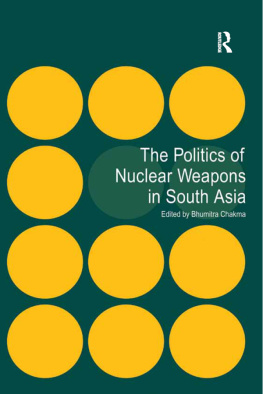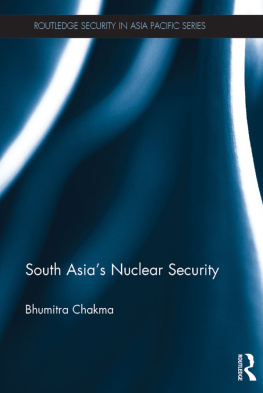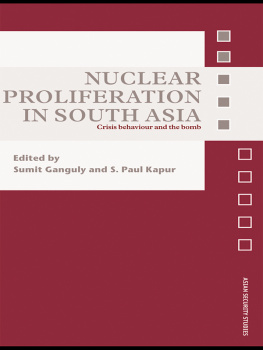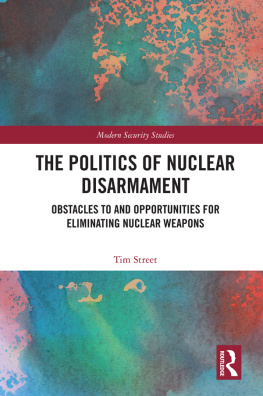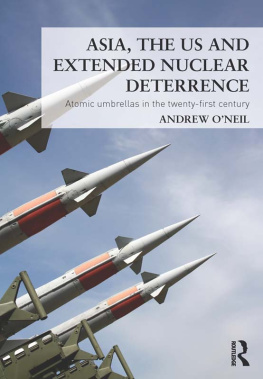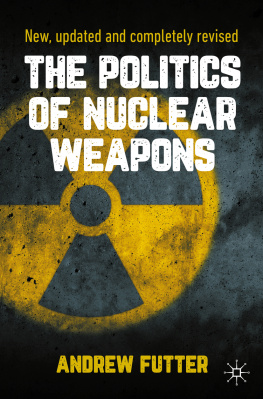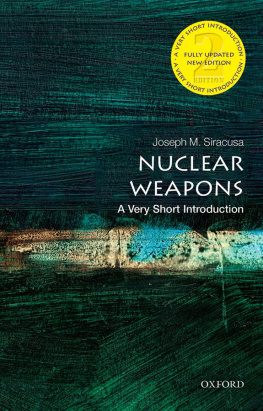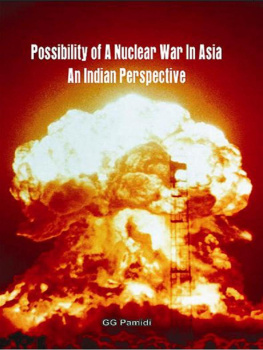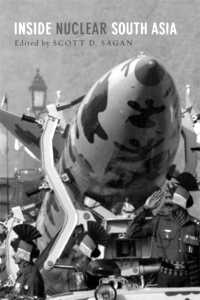THE POLITICS OF NUCLEAR WEAPONS IN SOUTH ASIA
The Politics of Nuclear Weapons in South Asia
Edited by
BHUMITRA CHAKMA
University of Hull, UK
First published 2011 by Ashgate Publishing
Published 2016 by Routledge
2 Park Square, Milton Park, Abingdon, Oxon OX14 4RN
711 Third Avenue, New York, NY 10017, USA
Routledge is an imprint of the Taylor & Francis Group, an informa business
Copyright Bhumitra Chakma 2011
Bhumitra Chakma has asserted his right under the Copyright, Designs and Patents Act, 1988, to be identified as the editor of this work.
All rights reserved. No part of this book may be reprinted or reproduced or utilised in any form or by any electronic, mechanical, or other means, now known or hereafter invented, including photocopying and recording, or in any information storage or retrieval system, without permission in writing from the publishers.
Notices:
Product or corporate names may be trademarks or registered trademarks, and are used only for identification and explanation without intent to infringe.
British Library Cataloguing in Publication Data
The politics of nuclear weapons in South Asia.
1. Nuclear weaponsSouth Asia. 2. Nuclear arms controlSouth Asia. 3. South AsiaForeign relations. 4. National securitySouth Asia. 5. IndiaMilitary relationsPakistan. 6. PakistanMilitary relationsIndia.
I. Chakma, Bhumitra.
327.17470954-dc22
Library of Congress Cataloging-in-Publication Data
The politics of nuclear weapons in South Asia / [edited] by Bhumitra Chakma.
p. cm.
Includes bibliographical references and index.
ISBN 978-1-4094-2625-7 (hbk)
1. Nuclear weaponsSouth Asia. 2. PakistanForeign relationsIndia. 3. IndiaForeign relationsPakistan. 4. Arms raceSouth Asia. 5. Nuclear disarmamentSouth Asia. I. Chakma, Bhumitra.
UA832.7.P65 2011
355.02170954dc22
2011011354
ISBN 9781409426257 (hbk)
Contents
Bhumitra Chakma
Rajesh M. Basrur
Sumit Ganguly
Bhumitra Chakma
Swaran Singh
Bhumitra Chakma
Binoda Kumar Mishra
Bhumitra Chakma
Nishchal Nath Pandey and Bhumitra Chakma
Nicholas J. Wheeler
Zafar Nawaz Jaspal
Dipankar Banerjee
Bhumitra Chakma
List of Contributors
Major General (Retd.) Dipankar Banerjee
Mentor, Institute for Peace and Conflict Studies, New Delhi, India.
Rajesh M. Basrur
Senior Fellow, S. Rajaratnam School of International Studies, Nanyang Technological University, Singapore.
Bhumitra Chakma
Senior Lecturer and Director, South Asia Project, Department of Politics and International Studies, University of Hull, UK.
Sumit Ganguly
Rabindranath Tagore Chair of Indian Cultures and Civilizations and Director of International and American Security, Indiana University, Bloomington, USA.
Zafar Nawaz Jaspal
Assistant Professor, School of Politics and International Relations, Quid-e-Azam University, Islamabad, Pakistan.
Binoda Kumar Mishra
Fellow, Maulana Abul Kalam Azad Institute of Asian Affairs, Kolkata, India.
Nishchal Nath Pandey
Director, Centre for South Asian Studies, Kathmandu, Nepal.
Swaran Singh
Professor and Chairperson, Centre for International Politics, Organisation and Disarmament, Jawaharlal Nehru University, New Delhi, and President, Association of ASIA Scholars (and Asia-wide network on Asian Studies).
Nicholas J. Wheeler
Professor in the Department of International Politics and Director of David Davies Memorial Institute of International Studies, Aberystwyth University, Wales, UK.
Preface
The conduct of nuclear tests by India and Pakistan in May 1998, happening at a time of relatively stable international order after the end of the Cold War, was like a bombshell. Washington had stopped New Delhi from undertaking such a nuclear test attempt in December 1995 by putting pressure on the Narashima Rao government when the intelligence agency of the former detected preparations for such a test at Pokhran. In 1998, no such detection occurred and the Indian Prime Minister Atal Behari Vajpayee stunned the world by announcing on 11 May 1998 that his countrys scientists had undertaken a series of successful underground nuclear weapons tests. Washington geared up its diplomatic machinery to stop Pakistan from undertaking reactive nuclear tests, but eventually failed. When India tested, it was only a matter of time before Pakistan would follow suit and the Pakistanis accomplished that two weeks later.
The South Asian development in 1998 was immensely significant. It shook global nuclear politics. No other state, besides the five traditional nuclear powers (USA, Russia/Soviet Union, UK, France and China), had conducted open nuclear tests before the IndoPakistani tests since the conclusion of the Nuclear Non-Proliferation Treaty (NPT) in 1968. The event marked, as Paul Bracken has asserted, the actual beginning of the Second Nuclear Age.
The immediate victim of the IndoPakistani tests was the global non-proliferation regime, particularly the NPT. It threw the NPT into an intractable dilemma because it could neither accept India and Pakistan as nuclear weapons states nor deny the reality of the two countries possession of nuclear weapons. It severely jolted the credibility of the NPT as the key pillar of nuclear non-proliferation and a new twist was added to global nuclear politics that would carry an impact in the years to come.
If not earlier, India and Pakistan acquired the capability to build nuclear weapons by the end of the 1980s and the world had known their possession of nuclear weapons at least from the early 1990s. The nuclear tests of 1998 made their clandestine possession of nuclear arsenals overt. Was overt nuclearisation a good idea at all for a region otherwise known as an conflict unending? As if to keep such a status alive, India and Pakistan fought a brief, but intense, war over the disputed territory of Kashmir in 1999, barely a year after their nuclear tests. Then with only two years respite, the forces of the two countries stood face to face in 200102 in a ten month-long military stand-off, when they reportedly came close to nuclear war at least twice! The two countries again came close to another crisis in the wake of the terrorist attacks on Indias financial capital, Mumbai, in November 2008 by Pakistan-based militant group Laskar-e-Toiba. Surprisingly, this time the attacks did not explode into a major crisis. But any such future terrorist attack on India by Pakistan-based terrorist groups may not produce such an outcome.
As an openly nuclearised South Asia passed its first decade, the South Asia Project within the Department of Politics and International Studies at the University of Hull, UK, organised an international conference on the politics of nuclear weapons in the region in August 2008. The conference discussed issues ranging from the state of Indo-Pakistani nuclear deterrents and their nuclear doctrines, and the role of two systemic actors in the regions nuclear politics, to the implications of the regions overt nuclearisation and its confidence-building and nuclear arms control challenges.


